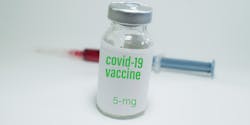This article has been updated.
Novavax, Inc., a Gaithersburg, Maryland-based pharmaceutical company, has received $1.6 billion from the U.S. as part of Operation Warp Speed, the government’s push to stockpile potential vaccines, treatments, and medical supplies for COVID-19. The deal is to secure 100 million doses by January 2021.
“The pandemic has caused an unprecedented public health crisis, making it more important than ever that industry, government and funding entities join forces to defeat the novel coronavirus together. We are honored to partner with Operation Warp Speed to move our vaccine candidate forward with extraordinary urgency in the quest to provide vital protection to our nation’s population,” said Stanley C. Erck, president and chief executive officer of Novavax.
The 10-figure award is the largest sum yet from the initiative, which has been placing progressively larger orders on a month-by-month basis. Johnson & Johnson received $456 million for orders of its own vaccine candidate in March. In April, Moderna Inc. received $486 million, and in May, AstraZeneca received $1.2 billion for the vaccine it’s producing in partnership with Oxford University. Other possible benefactors of the Warp Speed initiative include Pfizer Inc. and Merck & Co., both of which are developing their own therapies.
Operation Warp Speed is a partnership between many branches of the Department of Health and Human Services, including the Center for Disease Control and Prevention, the Food and Drug Administration, and the Biomedical Advanced Research and Development Authority alongside the Department of Defense. It consists of a broad strategy to combat the novel coronavirus by promoting manufacturing of vaccine candidates, treatments, and medical equipment, especially in the United States.
According to the Department of Health, the initiative aims to be able to deliver 300 million doses of a COVID-19 vaccine by January of next year. That time frame, if achieved, would notch a remarkable turnaround of 12 months between when the virus’s genetic sequence was distributed to usable vaccine.
At press time, two vaccine candidates, those produced by AstraZeneca and Sinopharm, are already in wide-scale Phase III trials, typically the last phase in human testing before deployment. Moderna announced in early June that its own vaccine candidate was ready for Phase III testing, but has not yet been approved.
About the Author
IW Staff
Find contact information for the IndustryWeek staff: Contact IndustryWeek
